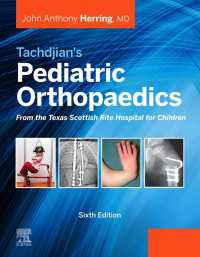Full Description
With chapters by leading scholars of criminology from across the country, The Aotearoa Handbook of Criminology represents a state-of-the-art account of crime and criminal justice in Aotearoa New Zealand.
The handbook is structured into four parts that explore the politics of researching and representing crime, key types of crime, the workings of criminal justice, and the differential experiences of crime and justice. The handbook outlines the foundations of current approaches to crime, victims and offenders alongside critical, decolonising, and feminist perspectives on criminological ideas and practices.
Fully referenced and with study questions and further reading, The Aotearoa Handbook of Criminology will be a critical resource to New Zealand students and practitioners. It will also help propel future improvements to how we define crime, how we prevent it, and how we can respond in much better ways to those who are victimised by crimes and wider harms.
Contents
1. Introduction: Criminological Transformations
Part One: Crime Knowledge, Crime Politics
2. Representing Crime: Shaping Understandings, Building Hegemony
3. Counting Crime and Victims: The Case of 'Volume Crime'
4. Researching Crime and Criminal Justice: Funding, Politics, and Ethics
Part Two: Crimes
5. Crimes of Intoxication: Unsettling the Alcohol/Drugs-Crime Link
6. Sexual Violence: The Logic of Patriarchy
7. Responding to Intimate Partner Violence: Connecting Law, Language, and Supports
8. Cybercrime and Cyber-Harm: Exploring Young People's Sharing of Intimate Images
9. Hate Crimes, Racism and Islamophobia: 'This Is Exactly Who We Are'
10. Environmental Harm: Clean and Green, or Brutal and Contaminated?
11. White-Collar Crimes: Culpability, Causes, and Control
12. Ignoring State-corporate Crimes: The Case of the Pike River Mine Disaster
Part Three: Criminal Justice
13. Penal Populism: Its Life and Death
14. Policing: Past, Present and Future
15. Crime Prevention: Exploring Conventional Practices
16. Nga Kooti o Aotearoa / New Zealand Courts: Building Maori-focused Approaches, Developing Therapeutic Justice
17. Sentencing: From Parity to Problem-solving
18. The Youth Justice System: A Site of Evolution and Reform
19. Community Sentences: Expanding a System of Control and Surveillance?
20. Restorative Justice: The 'Land of the Long White Lie'
21. Hyper-incarceration: Inequality and Imprisonment
22. Rehabilitation: Risks, Needs, and Building Good Lives
23. (Re)integration: Recentring Strengths in Communities
24. Prison Abolitionism: Philosophies, Politics, and Practices
Part Four: Differential Experiences
25. Victimology: From Criminality to 'Victimity' and the Problem of Victim Blame
26. Police Racism: The Responsibilities of Police Leadership
27. Rangatahi Maori, Samoan Talavou, and Youth Justice: Challenging the Monoculture through Decolonising Practices
28. Mental Health and Crime: A Critical Review
29. Neuro-disabilities and Criminal Justice: Time for a Radical Rethink
30. Gangs: The Politics and Political Management of the 'Gang Problem'
31. Decriminalising Crimes: The Case of Sex Work
32. Deportations: Sorting Citizens across Borders
Contributors
Index






